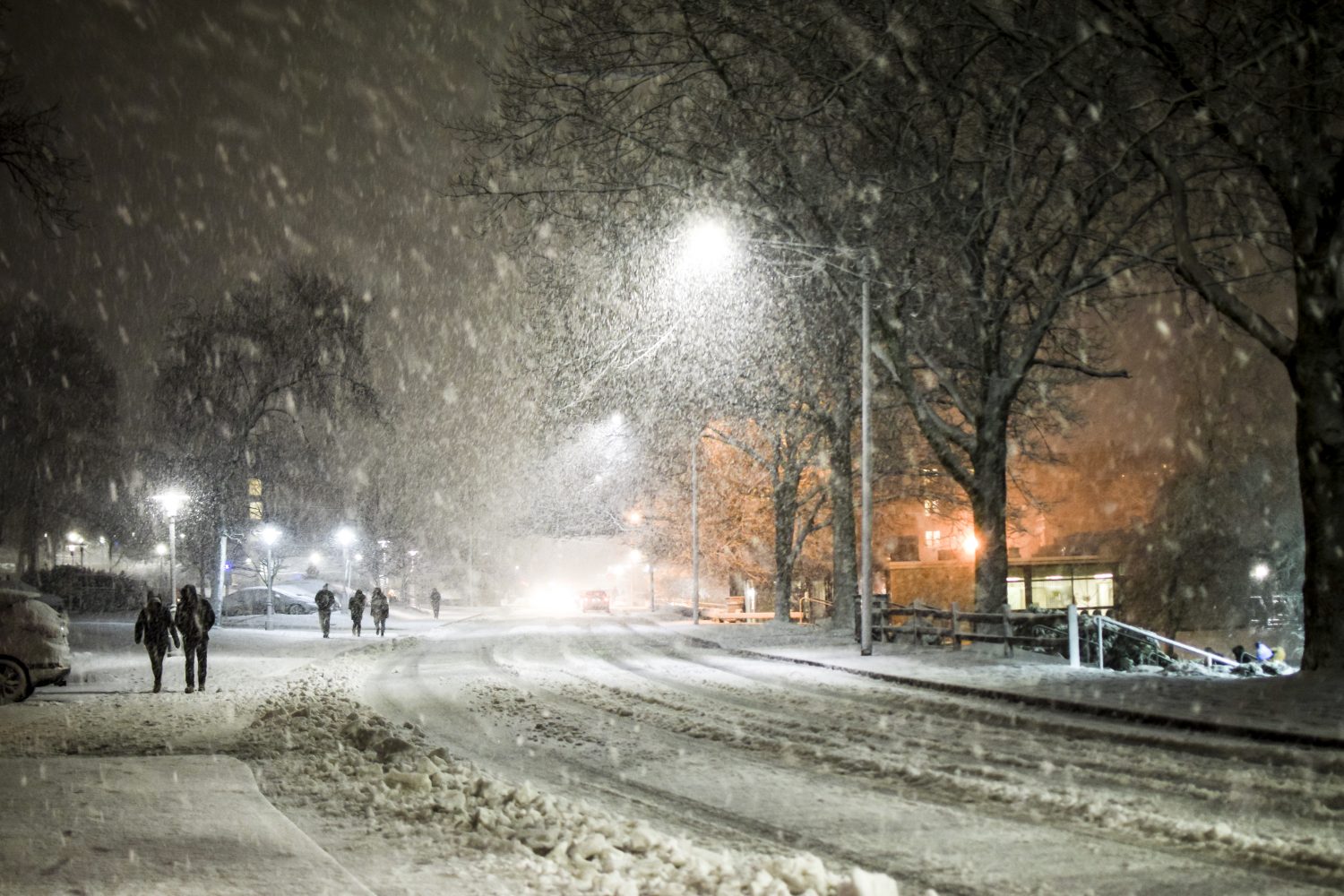Photo by Joe Lachance |CIGAR| As the University encounters storm after storm, many members of the community are wondering how exactly the administration are responding to the tumultuous weather.
During the past several weeks, the University of Rhode Island has experienced several nor’easters, which have resulted in large amounts of rain, wind, and snow. To deal with these storms, the University has extensive procedures in place to keep members of the URI community safe.
The Assistant Director of Emergency Management and Public Safety, Samuel Adams, said there is a stakeholder group, the Campus Emergency Management Advisory Council, which meets monthly. Adams said they represent everyone from facilities to dining services to student life on campus, as well as satellite campuses.
Adams said they typically get first notice of a storm 72 hours before it is forecasted to occur.
“At the 48 hour mark, we start paying more attention to it,” Adams said. “At the 24 hour mark, we start doing conference calls with our partners from the council.”
During these calls, Adams said they discuss the current weather forecasts and what any potential hazards may be. Snow accumulation, road conditions, power outages and falling trees are some the potential hazards, among other things. Once they are closer to the storm, they address whether or not to cancel classes and other events.
Adams said the South Kingstown Emergency Management and Providence Emergency Management are also involved in these discussions. He said URI’s Emergency Management and Public Safety Department plays a big role in communications in preparation for a storm. “It is important to emphasize that safety is always our first consideration,” Adams said.
Adams said that while Emergency Management can make recommendations to cancel class, it is ultimately up to the discretion of the Provost whether or not class is cancelled. Furthermore, he said it up to the Governor’s Office to determine which staff have to come to campus. Even if classes are cancelled, all employees must come unless otherwise directed by the governor.
When determining if class is cancelled, Adams said the University tries to wait to make the call as long as possible while still doing it early enough that members of the community can plan around cancellations. “Everyone is always very happy when we cancel classes but then it really disrupts your curriculum,” Adams said. “So, we try to wait as long as possible to cancel classes, but at the same time do it early enough for people to make alternative plans.”
For the snow storm this week, Adams said the wind was not supposed to be as strong as the storm that occurred the weekend before spring break. However, he said it it was still forecasted to be windy, and falling trees and power outages are always a concern.
In the storm that occurred the weekend before spring break on March 2, there were numerous power outages in Kingston and the surrounding area. At the University, places such as fraternity and sorority houses, as well as the Gateway Apartments, lost power. The Assistant Dean of Students, Dr. Stephen Simo, said power outages in Greek Life housing meant that some residents of fraternity and sorority houses had to temporarily seek alternate housing options.
Simo said that when the houses lose power, the fire walls only have a certain amount of battery life. Once the battery dies, he said the houses must do a fire watch or evacuate the buildings. A fire watch is when the house director, who are full time paid staff, goes through the house every 30-60 minutes to ensure there are no fires or fire hazards.
Simo said the decision to stay in the homes or evacuate was up to the individual house directors. He said the recommendation was to go to a friends house “down the line” [in Narragansett] or return home. However, residential life provided beds in the residence halls if they could not find an alternative living arrangement.
Adams said that Emergency Management gives recommendations to Student Life about what they believe they should do about evacuations and where students can go if evacuations are needed.
If there is a major emergency, Simo said the the Memorial Union can be used as warming centers. Adams said that it is not designated as a warming center, because it depends on the circumstance, but that it can be used.
Simo said that in order to be prepared for storms, house directors have received emergency training and are responsible to go over that training with residents.
As a long term solution, Simo said that Fraternity Circle is undergoing infrastructure renovations this summer. “They are going to put in new gas lines, new water lines, new power lines,” Simo said. “The utilities are all going to be upgraded and improved.”
By upgrading the infrastructure, Simo said each fraternity and sorority house will have the ability to buy a backup generator that can be tied into the new gas lines. Each house will be recommended to buy a generator, and it will ultimately be up to the housing corporations to purchase one with their own money. Simo said the housing corporations operate on state land but are all independent housing corporations.
Simo said that while the fire watches were not ideal, it was the best option they had to ensure fire safety in the houses. “It’s paramount to keeping students safe,” Simo said, “The backup generators will be best.”
While the past several storms have been wintery in nature, Adams said that the University is prepared for all storms and not just winter storms. However, he said winter storms are often dealt with the most.
“No two storms are alike and it’s hard to pinpoint the weather ahead of time until it’s happened, especially in New England of all places,” Adams said. “But, we have a good team, good collaboration and I think we do as good a job as we can expect.”





